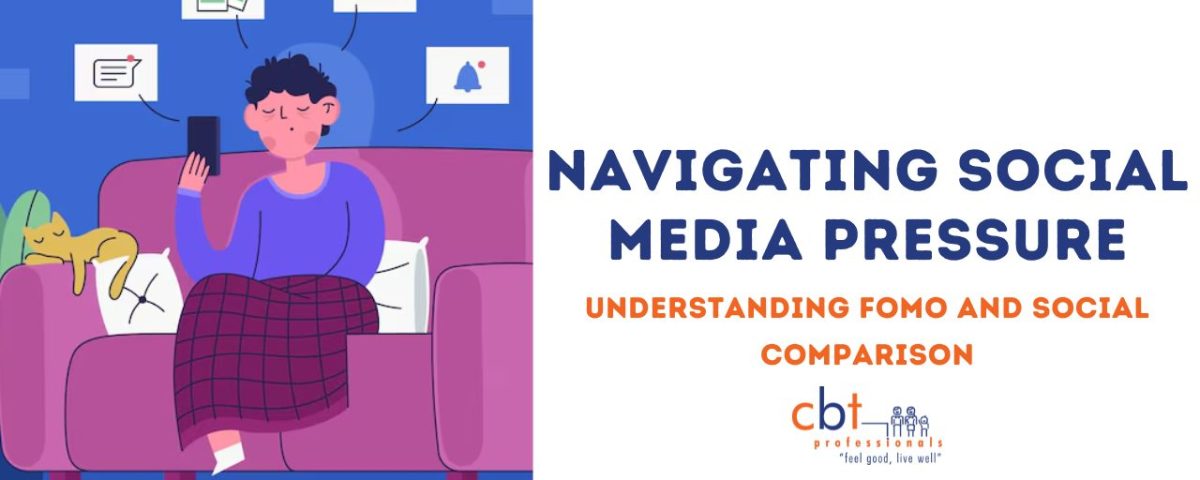Navigating Social Media Pressure: Understanding FOMO and Social Comparison
In today’s digitally interconnected world, social media has become an integral part of our daily lives. Platforms like Instagram, Facebook, and TikTok offer a window into the lives of others, showcasing seemingly perfect moments and curated experiences. However, beneath the surface of these curated feeds lies a complex psychological landscape where feelings of inadequacy, envy, and anxiety can thrive. This phenomenon is often encapsulated by two key concepts in psychology: FOMO (Fear of Missing Out) and social comparison. Understanding these concepts is crucial for navigating the pressures of social media and maintaining a healthy relationship with digital platforms.
FOMO: The Fear of Missing Out
FOMO is a pervasive feeling of anxiety that arises when individuals believe that others are experiencing more rewarding or fulfilling experiences than they are. This fear is often exacerbated by social media, where users frequently share highlights of their lives, presenting an idealized version of reality. As individuals scroll through their feeds, they may encounter images of friends attending parties, travelling to exotic destinations, or achieving professional milestones, which can trigger feelings of inadequacy and discontentment.
Psychologically, FOMO is rooted in a desire for social acceptance and belonging. The fear of missing out on exciting events or experiences can lead individuals to compulsively check their social media feeds, seeking reassurance and validation. This continuous engagement with social media can create a cycle of anxiety and restlessness, ultimately impacting mental well-being.
Research suggests that FOMO is particularly prevalent among younger generations who have grown up immersed in digital culture. The constant influx of information and updates can foster a sense of urgency to stay connected at all times, contributing to a state of perpetual dissatisfaction.
Social Comparison: The Perils of Comparing
Social comparison refers to the tendency of individuals to evaluate themselves in relation to others. On social media, this process often involves comparing one’s own life achievements, appearances, and experiences with those of others. However, such comparisons are often skewed, as social media tends to highlight positive moments while concealing struggles and challenges.
Engaging in frequent social comparison can have detrimental effects on self-esteem and mental health. Constant exposure to idealized images and narratives can distort perceptions of reality, leading individuals to underestimate their own accomplishments and overestimate the success of others. This phenomenon is often referred to as “compare and despair,” where individuals feel inadequate or unworthy based on unrealistic standards set by social media.
Strategies for Navigating Social Media Pressure
While the influence of social media on our well-being is profound, there are strategies that individuals can employ to mitigate its negative effects:
- Limit Screen Time: Setting boundaries on social media usage can reduce exposure to triggering content and alleviate feelings of FOMO. Designating specific times for social media engagement and prioritizing offline activities can promote a healthier balance.
- Practice Mindfulness: Cultivating mindfulness can help individuals become more aware of their emotional responses to social media. Mindfulness techniques, such as meditation and deep breathing, can foster resilience and reduce reactivity to comparison triggers.
- Curate Your Feed: Being intentional about the content we consume is crucial. Unfollowing accounts that promote unrealistic ideals and cultivating a diverse feed that reflects genuine experiences can promote authenticity and reduce comparison.
- Focus on Gratitude: Practicing gratitude can shift the focus from what is lacking to what is present in one’s life. Keeping a gratitude journal or regularly reflecting on personal achievements can bolster self-esteem and combat feelings of inadequacy.
- Seek Support: Openly discussing feelings of FOMO and social comparison with trusted friends or mental health professionals can provide validation and perspective. Building a supportive network can help individuals navigate the pressures of social media more effectively.
FOMO and social comparison are prevalent phenomena exacerbated by the pervasive influence of social media.
Understanding these psychological dynamics is essential for cultivating a healthy relationship with digital platforms and preserving mental well-being. By implementing strategies that promote self-awareness, authenticity, and emotional resilience, individuals can navigate social media pressures more effectively and embrace a balanced approach to online engagement. Ultimately, by prioritizing genuine connections and self-acceptance, we can mitigate the adverse effects of FOMO and social comparison in the digital age.
Are you struggling with the constant pressure and anxiety induced by FOMO (Fear of Missing Out) in today’s digital world? At CBT Professionals, we understand the profound impact that social media can have on mental well-being, and we’re here to help you navigate these challenges through evidence-based Cognitive Behavioural Therapy (CBT).
Take the First Step Towards Recovery
Don’t let FOMO control your life. Take charge of your mental well-being with the support of our dedicated CBT professionals. Contact us today to schedule a consultation and embark on a journey towards greater self-awareness, resilience, and emotional balance.
Together, we can overcome FOMO and embrace a healthier relationship with social media.
Helensvale: (07) 5551 0251
Mount Gravatt: (07) 3102 1366
Nerang: (07) 5668 3490
If you, or someone you know, require help, please reach out to organisations like Beyond Blue.
Additionally reach out to these organisations that may be able to help.
- ReachOut (youth mental health service) — online help
- SANE Australia — call 1800 187 263
- Mental Illness Fellowship of Australia (MIFA) — call 1800 985 944
- LifeLine 13 11 14 — for anyone in crisis
(Health Direct, 2020).
If this is an emergency, please contact 000 or visit your local emergency department.
Disclaimer: Content on this website is provided for education and information purposes only and is not intended to replace advise from your doctor or registered health professional. Readers are urged to consult their registered practitioner for diagnosis and treatment for their medical concerns.
THREE CONVENIENT LOCATIONS
MOUNT GRAVATT
Mt Gravatt Medical PrecinctSE 105, 1808 Logan Rd
Upper Mount Gravatt QLD 4122


